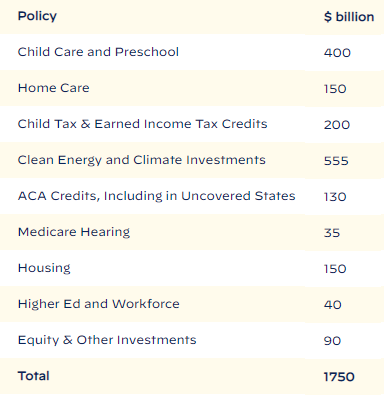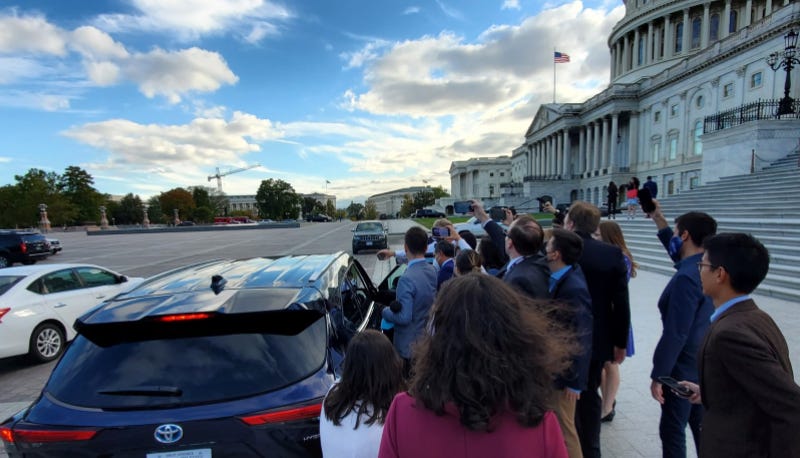Pelosi forced to back down again on infrastructure vote
Democrats still haggling over reconciliation details
There’s a deal on a framework for a big reconciliation bill. But the details aren’t final. Progressives force Pelosi to hold off on infrastructure. And lawmakers give ‘Meta’ a thumbs down. This is “Regular Order” for October 29, 2021.
DEMS IN DISARRAY. Thursday was not a good day for Democratic leaders on Capitol Hill. Yes, they now have an agreement on a framework for a reconciliation deal - but the details aren’t final by any means. And an effort by Speaker Nancy Pelosi to force House action on a long-stalled infrastructure bill was torpedoed again by liberal Democrats.
RECONCILIATION. It’s another step forward for Democrats. President Biden on Thursday trumpeted an agreement on the outlines of a $1.75 trillion, 10-year budget reconciliation bill. But it’s a framework - as the final details of the massive tax and spending plan remained uncertain last night - making it impossible to predict when the House and Senate might vote.
BIDEN. After meeting with House Democrats at the Capitol on Thursday morning, Mr. Biden praised the deal in remarks at the White House. "It’s a framework that will create millions of jobs, grow the economy, invest in our nation and our people," the President said.
WHAT'S IN. Universal preschool. Child care. Elder care. A one-year extension of the child tax credit. There's investments in clean energy. New tax credits for the Obama health law. Expanded Medicare coverage for hearing. Read the bullet points at this link.
WHAT'S OUT. Expanded Medicare coverage for dental and vision did not make the cut. A new paid family and medical leave plan is out. Two years of free community college was not included. New prescription drug plans under Medicare. A wealth tax on billionaires was left on the sidelines as well.
THE FIGURES. Here are the bullet points on new spending, and how much money is involved. All of this is still subject to change.
NOT INFRASTRUCTURE WEEK. Even with the agreement on the outlines of a $1.75 trillion reconciliation bill, Thursday was a messy day for Democratic leaders in Congress. House Speaker Nancy Pelosi wanted the House to approve a long-delayed infrastructure bill, but progressives Democrats refused to yield, again delaying a final House vote.
PELOSI. Let's not sugarcoat this. The refusal of progressives to allow an infrastructure vote on Thursday was another rebuke for Pelosi, who made very clear she wanted action. "Let's not just keep having postponements and leaving any doubt as to when this will happen,” she told reporters.
DELAY. But a few hours later, the House did exactly that - approving a 5-week authorization for federal highway programs - and again postponing the infrastructure vote. That was the option Pelosi did not want.
PROGRESSIVES. Liberal Democrats again said they would not allow the House to move ahead on infrastructure until the reconciliation bill was finished. "Members of our Caucus will not vote for the infrastructure bill without the Build Back Better Act," said Rep. Pramila Jayapal (D-WA).
BILL TEXT. Pelosi tried to buffalo progressives by releasing an updated version of the reconciliation bill. But everyone knew that wasn’t the final bill. And it wasn’t enough for progressives to give in.
PRESCRIPTION DRUGS. One item not in the updated bill was an effort to lower prescription drug prices by giving Medicare the power to negotiate the cost of those drugs. But it's clear that work continues on the issue. "It's kind of a soft ‘not in,’ as opposed to a hard ‘not in,’" Rep. Richard Neal (D-MA), the chair of the Ways and Means Committee told reporters.
SALT. Another major tax issue that is not addressed as yet is on state and local taxes, as several Democrats on Thursday again vowed that if there's no relief for their upper income taxpayers - they'll vote no. "No SALT, no deal," said Rep. Tom Suozzi (D-NY).
WORK TO DO. You can see from just those two items - and they aren't the only outstanding matters - that this bill will continue to change. How long that goes on is unclear at this time.
SENATE SIDE. Outside the Capitol on Thursday afternoon was a good snapshot of where Democrats are - happy about the direction, but not sure about the exact details. “We have a really good bill,” Sen. Sherrod Brown (D-OH) told me. “I think it's going to change people's lives.”
TIMING. “The bill is going to get to the President's desk,” Brown declared on a gorgeous late October afternoon. “I don't know when. I don't tell the House what to do and I don't make predictions about process.”
VOICES. Not far away behind security fencing were liberal activists calling after Democratic Senators (and people they mistakenly thought were Senators). “Senator, please call Joe Manchin for us.”
TIGHT LIPPED. You've seen the pictures of Sen. Joe Manchin (D-WV), surrounded by reporters, holding court outside the Capitol, mugging for pictures with Bernie Sanders. He clearly enjoys the back and forth. So, when Manchin was saying next to nothing on Thursday about the reconciliation deal - it was very notable.
DEAL OR NO DEAL. Manchin could have simply said, "I support the agreement." But he mumbled about it. Asked if he backed the price tag of $1.75 trillion, he simply said, “That was negotiated.” Then he hopped into his car after a final Senate vote for the week.
SINEMA. Sen. Kyrsten Sinema (D-AZ) emerged a few minutes later and was escorted to her car by reporters. "I put out a statement," she said, as we all jostled with each other to hear the Arizona Democrat say nothing. Her statement supported the effort, but it wasn't a ringing endorsement.
MANCHIN PART DEUX. Later, Manchin put out a reconciliation statement on Twitter which was swiftly denounced as mealy-mouthed. “You have got to be kidding,” fumed Democratic strategist Jim Manley. “You are doing the president and your party no favors here senator.”
IRS ENFORCEMENT. The updated reconciliation bill released Thursday by Democrats did not include a new IRS bank reporting rule to help ferret out tax cheats. "This was a bad idea and a bad way to go about collecting revenue," said Rep. Chris Pappas (D-NH).
DEFUND THE TAX POLICE. Just because the provision is being dropped by Democrats, don't look for Republicans to suddenly forget about the issue. The bill would give the IRS a budget boost to hire more agents - and that's certain to draw more opposition from the GOP.
BIG OIL. A six hour hearing with top executives from four major oil companies broke little new ground on Thursday, as Democrats vowed to issue subpoenas to ExxonMobil, Chevron, BP, and Shell for internal documents on climate disinformation. "There will be accountability," said Rep. Ro Khanna (D-CA).
GOP. Republicans saw it differently. "We strongly feel this is an infringement on their First Amendment rights," said Rep. James Comer (R-KY), the top Republican on the House Oversight Committee. "We're supposed to focus on waste, fraud and abuse in the federal bureaucracy."
SUBPOENAS. Democrats scoffed at information turned over by the companies, saying it was nothing but material from yearly reporters and company websites. "They produced documents but they were not the documents that we requested," said panel chair Rep. Carolyn Maloney (D-NY).
REMOTE. The most notable thing about this hearing was that all of the witnesses opted to testify remotely. That denied Democrats a group photograph of the Big Oil execs standing together swearing to tell the truth - just like the Tobacco execs from 1994.
FACEBOOK. The announcement on Thursday of a name change for Facebook didn't do anything to deter critics in Congress. "Facebook wants us to start calling it Meta, but we’re just going to keep calling it what it is, a threat to privacy, democracy, and children," said Sen. Ed Markey (D-MA).
BIG TECH. When it comes to Facebook and other social media sites, there's a lot of lawmakers talking and complaining about Big Tech - but there doesn't seem to be much chance of any legislative solution to deal with social media. My column this week in the Atlanta Journal-Constitution.
LOU GEHRIG. Sen. Susan Collins (R-ME) was honored Thursday on the Senate floor, as she has now gone over 8,000 votes without missing a single Senate roll call. That streak started back on January 22, 1997 with a fairly notable vote - the confirmation of Madeleine Albright as Secretary of State in the Clinton Administration.
RECORD. Collins holds the record for a Senator who has never missed a vote. It's the third-longest consecutive voting streak in Senate history. Topping that list is William Proxmire (D-WI), who cast 10,252 straight votes, and Sen. Charles Grassley (R-IA), whose streak ended last year at 8,927 votes.
MUSE OF HISTORY. October 29, 1929. This was Black Tuesday on Wall Street, as the market crash triggered the Great Depression. Congress stood by helplessly and watched the financial damage pile up. A Senate resolution said ‘it appears impossible, in the absence of any great natural physical calamity,’ that the markets could shed $16 billion in value. Sen. James Robinson of Arkansas bemoaned the "stock exchange debacle." "The power and prestige of the United States has been greatly lessened in the eyes of everyone," Robinson said. It would take several years for Congress to truly dig into the market crash, with the Pecora Report.
LEGISLATIVE PROGRAM:
The House meets next on Monday.
The Senate convenes next on Monday.
President Biden’s daily schedule link.
Follow me on Twitter @jamiedupree. Email me at jamiedupree@substack.com





